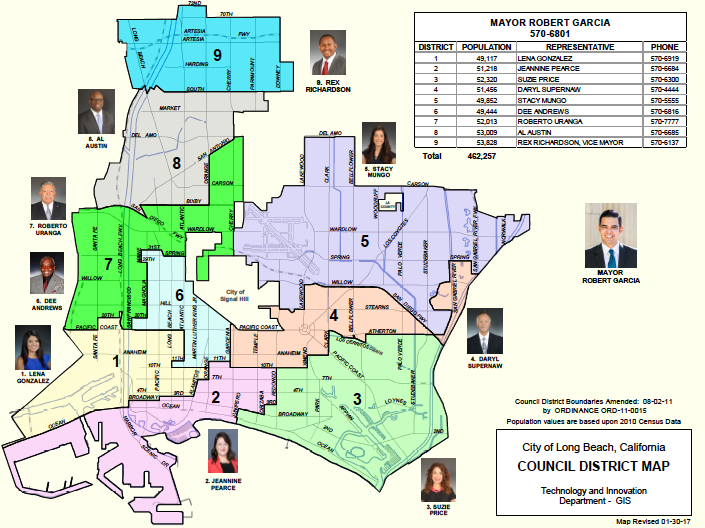Redistricting … I’ve been hearing a lot about that lately.
Issues around redistricting have become a national hot button issue in the past few years. You may have heard of the term “gerrymandering,” which is when legislative districts are manipulated in a way that favors one party over another. Many times those who benefit from such tactics are the very ones in charge of drawing the districts. This measure is an effort to prevent that type of funny business.
In Long Beach, the city council is currently responsible for examining and redrawing its own council district lines every five years. This measure would instead create an independent commission of 13 non-elected officials who would draw those maps starting in 2020.
Some of the most vocal proponents for this measure are from the city’s large Cambodian community who lobbied to put it on the ballot1 because they say their voting power has been carved up into multiple districts by the current council district map.
If Measure DDD passes, a screening panel will choose nine people from a pool of public applicants to serve on the newly established Redistricting Commission, one from each of the nine existing city council districts. These nine will then select the remaining four members, along with two alternates. The screening process was designed to closely model that of the state’s Citizens Redistricting Commission. However, not everyone in the Cambodian community is for Measure DDD. Over two dozen Cambodian community members signed a letter saying that the charter amendment is part of a scheme by the mayor to gain “supreme claim of control over the City of Long Beach for the next generation.”

Ok, but who makes up this screening panel?
This is the point that seems to be creating the most debate. Who makes up the screening panel will hinge on whether Measure CCC passes (remember that’s the one that will create an ethics commissions).
If an ethics commission is established, they would be the screening panel. In the scenario that voters establish a redistricting commission but not an ethics commission, the mayor would appoint three experts in good government and law to the screening panel2.
But if no experts are down for this, Plan C is a screening panel made up of the city attorney, the city clerk, and the city auditor.
Opponents say that because the partially mayor-appointed ethics commission could end up choosing some of the redistricting commissioners, the body would be less independent.
Will the public have a say in the creation of the maps?
Before adopting a final map, the commission would be mandated to hold nine public meetings, one in each district, in order to receive community input including comments and map suggestions. Once the commission settles upon a map, it is the law of the land.
Who’s for it?
Mayor Robert Garcia; City Auditor Laura Doud; Councilmember Al Austin II (CD 8); Equity for Cambodians, a group of Cambodian-Americans seeking more representation in Long Beach city government; and Common Cause, a nation-wide good government group focused on electoral reform.
Who's opposes it?
The Long Beach Reform Coalition and former Councilmember Rae Gabelich.
Related Coverage
FORTHE Media: Redistricting, Rebuttals, and Retorts: Support for Citizens Redistricting Pushes Forward; Some Still Aren’t Sold
Yes on Measure DDD
LA Times: There’s a Better Way to Draw Political Lines
No on Measure DDD
The Grunion: No on City Charter Measures
Impartial Analysis & Sample Ballot Arguments
City Clerk: Citizen Redistricting Commission
Copyright © 2024 FORTHE.org. All rights reserved.



